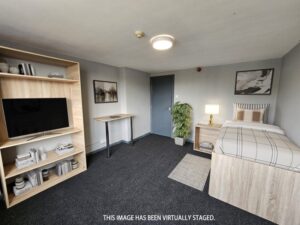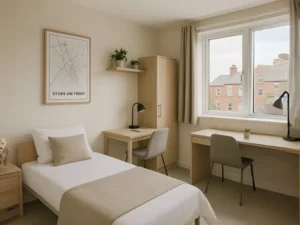Have you ever returned to your shared accommodation after a long holiday and felt out of sync with your housemates or surroundings? You’re not alone. After the holidays, it’s natural to feel out of sync when returning to your shared living space. Whether you’ve been away visiting family or travelling, getting back into your accommodation can feel like a big shift. However, with a few thoughtful steps, you can transform your shared space into a productive, enjoyable environment. By following these tips, you can create a better living experience and build stronger relationships with your housemates, all while maintaining a balance between work and relaxation.
1. Reorganize and Refresh Your Space
The first thing to consider when returning to your shared accommodation is to clean and declutter your space. A tidy room or shared area can do wonders for your mental health and help you feel more at ease after a break. Decluttering isn’t just about getting rid of things; it’s about creating a space that feels open and calming. Studies show that a clean space can boost productivity and focus.
For example, in a shared kitchen, make sure all unused items are cleaned or stored away, and food is organised to prevent any mess. It might be useful to create specific storage spaces for shared and personal food items. This not only keeps the space neat but also avoids conflicts between housemates about food storage.
Also, adding personal touches can make a huge difference. Personalised elements like photos, plants, or even new furniture can create a more welcoming atmosphere. If you’re working or studying from home, try making your workspace more efficient by reorganising your desk or investing in better lighting.
2. Set Clear Expectations and Boundaries
When you return, it’s important to touch base with your housemates and revisit the house rules and expectations. Setting clear guidelines can save time and prevent any misunderstandings later on. For example, if there were issues before with cleaning the common areas, address them now. You could set a rotating cleaning schedule to ensure everyone shares the responsibility of keeping the kitchen, bathroom, and living room clean.
Housemates might also have different noise preferences. If you’re a student studying at home, it’s useful to establish designated quiet hours, particularly in the evenings when people are likely to be working or studying. For example, setting quiet hours between 8 pm and 10 pm can help housemates understand when it’s time to be considerate of noise levels.
Similarly, openly discuss shared expenses. Create a fair system for splitting the cost of bills like Wi-Fi, electricity, and water. You can use apps like Splitwise to track shared expenses. This helps keep everything transparent and avoids awkward situations when it’s time to pay.
3. Plan Social Activities with Housemates

Living in shared accommodation is a great chance to connect with others, so why not take advantage of it? Regular social activities help strengthen relationships and create a sense of community. You could plan things like movie nights, cooking together, or even outdoor activities.
For example, plan a movie marathon one weekend where everyone contributes their favourite film or snack. A communal dinner night could be a fun way to bond with housemates and share cultural dishes if you’re living with people from different backgrounds. Not only does this help build friendships, but it also promotes a positive, social atmosphere.
However, it’s equally important to recognise the need for personal time. If one housemate prefers quiet evenings or solo activities, respect that boundary. Balance is key. Having a group chat or a shared calendar can help everyone stay updated on what’s happening and when people need some downtime.
4. Create a Productive Work/Study Environment

For students and professionals, your shared accommodation may also be a place where you need to work or study. The ability to stay productive in a shared space is crucial. One of the first steps is to set up a designated workspace. This can be a study desk or a quiet corner where you can concentrate without distractions.
For instance, if you live in a shared room, it might be worth using headphones to block out noise. Noise-cancelling headphones are a great investment for focusing on work or study. For those in shared flats, make sure to respect quiet times so that everyone can work without interruptions. You might also set a routine for quiet hours, perhaps between 9 am and 12 pm, to allow housemates who work or study to have an undisturbed space.
It’s also a good idea to set goals and stay organised. Use planners, calendars, or apps like Trello or Notion to keep track of important tasks. This way, you stay productive while still enjoying time with your housemates during social activities.
5. Budget and Manage Shared Expenses
Managing shared bills is essential in maintaining a harmonious living situation. One of the most common sources of tension in shared accommodation is the way household expenses are handled. Setting up a budget for shared costs is key. For example, you can have a fixed monthly allowance for utility bills, such as electricity, Wi-Fi, and water, and agree on how to divide these expenses.
Tools like Splitwise can help you track and manage shared costs. This allows each person to see their share and settle up with ease. To avoid confusion, agree on deadlines for payments and keep receipts or records of all transactions. For instance, if a housemate paid the Wi-Fi bill this month, they should be reimbursed by the others within a week.
It’s important to establish a system for handling grocery expenses as well. You can either set up a communal fund where everyone contributes a set amount for groceries, or each person can buy their own food. This system can work well if you label personal items clearly in shared kitchen spaces.
6. Stay Active and Healthy Together
Living in shared accommodation doesn’t mean you have to neglect your health. In fact, it can be an opportunity to stay active and healthy with housemates. Consider hosting group workouts or participating in online fitness challenges. Many shared accommodations have common areas where housemates can exercise together.
You could also create a weekly meal prep session where everyone contributes ingredients to prepare healthy meals. This encourages both healthy eating and bonding. If you don’t have access to a gym, explore local parks for walking, jogging, or yoga sessions. Many shared accommodation spaces are near local parks, making them perfect spots for staying active together.
Additionally, share tips on mental health and wellness. Encourage open discussions where everyone can talk about their well-being and share ways to stay healthy, whether physically or mentally. Having a supportive environment contributes to a happier living experience.
7. Respect Each Other’s Personal Space
In any shared accommodation, it’s vital to respect each other’s personal space and privacy. While socialising is important, remember that everyone needs time alone. If one housemate prefers their room as a quiet retreat, make sure to respect that.
For example, if you want to have a party or gathering, give your housemates advance notice so they can plan accordingly. It’s also important to create boundaries for shared spaces. For instance, the kitchen or bathroom should be accessible to everyone, but it’s courteous to set time limits when others are waiting.
Creating a shared agreement about the use of personal items can also prevent misunderstandings. Label food or personal belongings in shared areas to avoid conflicts.
8. Get Involved in the Local Community
Once you’ve settled back into your accommodation, take the time to explore your local community. Living in a shared space often means you’re surrounded by a variety of shops, cafes, and events. You can visit nearby cafes like The Green Bean or enjoy a relaxing afternoon at the local St. John’s Park. Participate in events such as the monthly Farmers’ Market or check out fitness options at the nearby Gym. Spend some time discovering what your area has to offer. Visit nearby cafes, explore local shops, or attend local events. This will help you feel more connected to your new home.
Getting involved in community activities also creates opportunities to meet new people and expand your social network. Volunteer or participate in local charity events. Not only does this enrich your experience, but it also fosters a sense of belonging. This is especially important if you are living in an area that is new to you.
Read More: Tips for Finding Affordable Furniture for Your Shared Accommodation
Conclusion
After the holidays, it’s important to find a balance between personal time, social interactions, and shared responsibilities in your shared accommodation. By taking the time to reorganise your space, communicate openly, and create healthy boundaries, you can enjoy a fulfilling and stress-free living experience. Shared accommodation can be a wonderful experience when everyone works together to make it a productive and comfortable environment.
Do you have any personal tips for getting the most out of your shared accommodation? Share your experiences in the comments below! If you’re looking for affordable shared accommodation options, check out our listings to find the perfect space for students or professionals.
By taking small but meaningful steps, you can transform your shared accommodation into a space that fosters collaboration, community, and personal growth.




